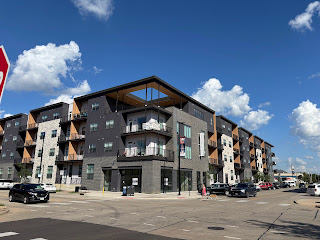Every morning before I go to work, I take a “constitutional” walk around my neighborhood. Occasionally I encounter a particular neighbor from the next block who walks his dog across to the median strip so it can relieve itself. (My street is a boulevard not only in name, but in the sense of having a median strip between the traffic lanes that is planted with grass and trees.) Neither the man nor the dog cleans up afterwards.
I’ve never said anything to him other than “Good morning.”
It’s hard for me to think of what I would say if I wanted to confront him (which
I don’t). There’s no direct harm to me or anyone from the poo itself: Once in a
great great while I’ll see some children horsing around on the median, but not
many people use it for anything other than a doggy potty. I’m not even terribly
fond of the median, the main effect of which is to add distance and something
of a barrier between neighbors on opposite sides of the street.
What concerns me about my neighbor’s behavior is that is an
example, all the more powerful because of its triviality, of the “tragedy of
the commons.” Philosopher Garret Hardin, in a famous 1968 essay with that
title, argued that people had an incentive to over-use common property because
they enjoyed immediate direct benefits while costs were both widely-distributed
and postponed to some future time. What is often overlooked when Hardin is
brought up is that he believed that, once informed, those same people could
regulate themselves to avoid creating the problems (in Hardin’s essay, of excessive
population growth). So, while incentives exist to overuse energy resources, or
sprawl into the next county, or drive when roads and parking spaces are “free,”
we in time come to recognize the social costs of those behaviors and we stop
doing them.
When my neighbor walks over to the median so his dog isn’t
pooping in his own yard (where he would probably feel the need to clean it up),
it reminds me that while Hardin is probably right about both aspects of his
argument, public recognition of community interests that outweigh individual
convenience or pleasure is not happening quickly or broadly enough to suit me. It's not just taking the dog to the median or park or college campus so he doesn't have to clean up his own yard. It's protesting a sidewalk project because it would be "disruptive." It's wider auto lanes, with separate lanes for turning left and turning right, so no car ever has to slow down. It's smashing through an older neighborhood to build a limited access highway.
I can't speak for other cultures, but our culture has a strong individualistic strain with a vocabulary to match. Daily advertisers pitch convenience to us as if it were an absolute good, while an oil company offers us "a full tank of freedom." We have yet to develop an equivalent vocabulary to talk about community, or a way to discuss balancing individual and community interests. This needs to happen soon if we're going to live together in this world.
I can't speak for other cultures, but our culture has a strong individualistic strain with a vocabulary to match. Daily advertisers pitch convenience to us as if it were an absolute good, while an oil company offers us "a full tank of freedom." We have yet to develop an equivalent vocabulary to talk about community, or a way to discuss balancing individual and community interests. This needs to happen soon if we're going to live together in this world.








No comments:
Post a Comment